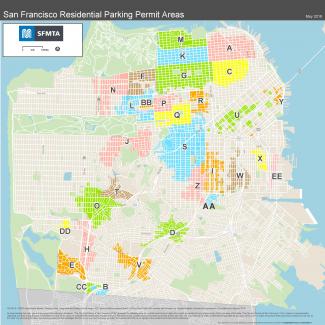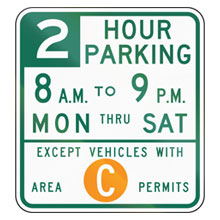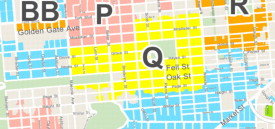Navigating San Francisco's Residential Parking Permit (RPP) System: Your Essential Guide
Ah, San Francisco. A city of iconic landmarks, vibrant culture, and... notoriously challenging parking. For many residents, owning a car in the city can feel like a constant quest for an elusive parking spot. This is where the San Francisco Residential Parking Permit (RPP) program steps in, offering a crucial lifeline for those living in dense neighborhoods. If you're a newcomer, or even a long-time resident looking to demystify the system, understanding the RPP is paramount.
The RPP program, created in 1976, was designed with a clear purpose: to reduce traffic congestion, particularly near downtown and BART stops, and to prioritize parking for local residents. It's the primary mechanism the city uses to manage residential street parking in certain neighborhoods. While the system can initially seem confusing, especially for those just moving to San Francisco from elsewhere, it's an indispensable tool for urban living.
What is San Francisco's RPP Program?
San Francisco's RPP program designates specific areas where parking is restricted to vehicles displaying a valid residential permit during certain hours. The city currently has 32 RPP Areas, most of which are less than one square mile, collectively covering about 75,000 parking spaces. These zones are strategically placed to ensure that residents of qualifying properties have a better chance of finding a spot on their block, rather than competing with commuters or visitors.
It's important to note that not every block or neighborhood in San Francisco is part of an RPP zone. If you're looking to find out more about Residential Parking Permit Areas, you can use the interactive map provided by the SFMTA to see if RPP regulations exist on your specific block. This is often one of the first things people check when considering a move to a new neighborhood, as it significantly impacts daily life with a vehicle.
Applying for Your San Francisco RPP
Obtaining a residential parking permit in San Francisco requires meeting specific criteria and submitting a thorough application. The Director of Transportation is responsible for issuing these permits upon receipt of a written application from a qualifying property resident.
Eligibility Requirements
- You must be a permanent resident of a property located within a designated RPP zone.
- Your vehicle must be registered and insured at the residential address you are applying for.
- Certain exemptions exist for this vehicle registration requirement, including students, caregivers, and businesses.
The Application Process
To apply, you will need to submit an application and provide proof of your residency within the designated parking zone. You can typically apply online or in person or by mail. When applying, you'll need to provide:
- Current California DMV vehicle registration.
- If your vehicle is not registered in your name and address with a valid San Francisco residential parking permit, you may need to submit current copies of two other documents to prove your residency.
Whether you are a permanent resident or a business owner in an RPP zone, the process involves completing the online or paper application. It's worth noting that each residential address may have specific rules regarding the number of permits allowed, so it's always best to check the latest guidelines.
Renewing Your RPP: Don't Get Ticketed!
Residential Parking Permits in San Francisco expire each year on a rolling basis. Current permit holders will receive a renewal notice in the mail approximately six weeks before their permit expires. This notice is crucial as it contains your account information and PIN number, which you'll need to use the online service to renew your San Francisco Residential Parking Permit (RPP) or Contractor Permit.
A critical point to remember: payment of delinquent tickets is required for permit renewal. If you have outstanding parking tickets, you must pay them before you can be issued a new permit. Renewal notices will not be sent to vehicles that have unpaid tickets, so it's essential to clear any outstanding fines promptly. It's always advisable to renew your permit as soon as possible after receiving your notice to avoid the inconvenience and cost of a parking ticket due to an expired permit.
The Shift to Virtual Permits: No More Stickers!
For many years, a long-held San Francisco tradition involved affixing a residential parking permit sticker to one's car bumper. However, this tradition has come to an end. Effective April 1, 2022, the SFMTA transitioned annual Residential Parking Permits (RPP) from physical stickers to virtual permits. This significant change aims to streamline the RPP application and enforcement process.
With this transition, SFMTA now uses License Plate Recognition (LPR) technology for RPP enforcement. This means your license plate serves as your permit verification, confirming that you are parked in your assigned parking area. This move offers several benefits, including simplifying the renewal process and eliminating the need for physical stickers that could peel or be lost.
Understanding RPP Costs and Revenue
While the convenience of an RPP is invaluable, it does come with a cost. Residential parking permits in San Francisco could become more expensive in the coming years. Discussions have included raising annual residential parking permit fees, potentially to $215 per vehicle by July 2025. These fees contribute to the overall management of the city's parking infrastructure.
It's important to distinguish RPP fees from parking meter revenue. The revenue generated from parking meters in San Francisco is specifically mandated by the City Charter to support Muni transit service and cannot be allocated for other uses. While RPP fees don't directly fund Muni in the same way, they are part of the broader system that helps manage traffic and parking challenges across the city.
Beyond RPP: Other Parking Considerations in SF
While the RPP is vital for residents, it's just one piece of San Francisco's complex parking puzzle. The city offers other parking permits and services for various needs:
- Temporary Permits: You can reserve a parking space for specific needs, such as a moving van or construction.
- Color Curb Zones: Applications are available for new Color Curb Zones (e.g., Driveway Red Zones, Blue, Green, White, or Yellow zones), which designate specific parking restrictions.
- Monthly Parking Permits: In addition to standard parking meters, monthly permits are available for designated parking lots throughout the city.
- Permit Transfer: If you've moved and changed addresses within the same RPP area or have purchased a new vehicle, you can apply for a permit transfer for a fee (e.g., $25.00), either in person or by mail.
San Francisco also employs flexible solutions like "Pay or Permit Parking," combining paid parking with residential permit parking to address challenges in certain areas. This approach is not unique to San Francisco, as many major cities adopt similar hybrid systems.
Final Summary
Navigating San Francisco's parking landscape requires a clear understanding of its Residential Parking Permit program. Created to alleviate congestion and prioritize resident parking, the RPP system involves specific application requirements, including proof of residency and vehicle registration. Annual renewals are crucial, with delinquent tickets needing to be paid before a new permit can be issued. The recent transition to virtual permits and License Plate Recognition (LPR) technology has streamlined the process, eliminating the need for physical stickers. While RPP fees may increase, they contribute to the city's overall parking management efforts. Understanding these facets, along with other available parking services, is essential for any San Francisco resident with a vehicle.

Residential Parking Permits (RPP) | SFMTA

Residential Parking Permit | SFGOV

Request a New or Expanded Permit Area | SFMTA